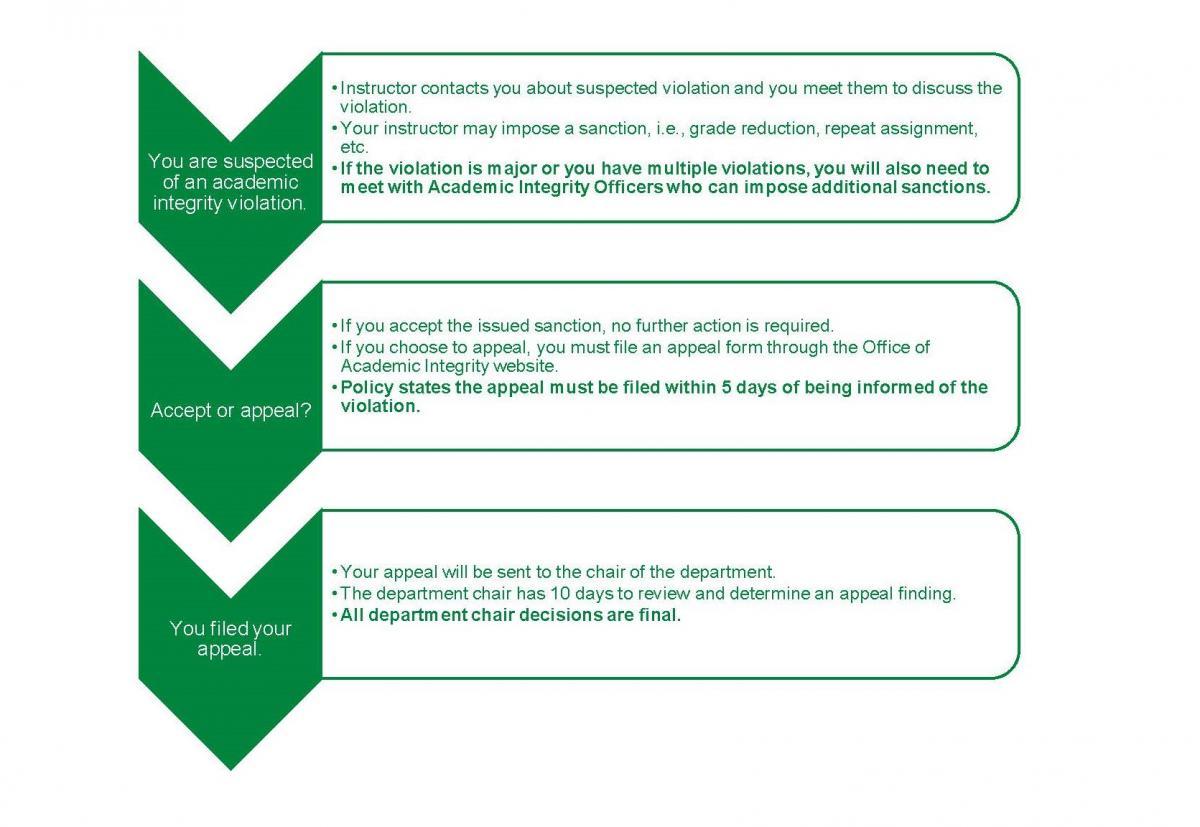- About Us
- Nest Builder
- Student Success Areas
- Back
- Student Success Areas
-
- Academic Advising
- Bookstore Adoptions for Faculty
- Growth Mindset - Faculty Focus
- Inclusive Curricula and Pedagogy Review Process
- Inclusive Curriculum Review Working Group
- Learning Center
- Learning Ecosystem
- Office of Academic Integrity
- Office for Strategic Retention Initiatives
- Overview for Inclusive Curriculum and Pedagogy
- Ricco Ethics Scholarship
- Small Grant Program
- Student Perceptions of Teaching
- Student Retention Resources
- Thank a Teacher
- Academic Intergrity
- Forms/Templates
- Calendar
Frequently Asked Questions - Students
Below are Frequently Asked Questions about the Office of Academic Integrity for students: please click on each question to see its answer. If you have any additional questions, please email academic.integrity@unt.edu.
How does the academic integrity process work?

Why did my professor file a report to the Academic Integrity Office?
Instructors are required to report Academic Integrity violations to the UNT Academic Integrity Office if they deem that a preponderance of evidence shows a violation. The faculty, administration, and students all have had input on the formulation of Student Academic Integrity Policy (UNT Policy 6.003). The university has deemed academic integrity a value intrinsic to education and to the validity of a UNT degree. You have the due process right to appeal the instructor's Academic Integrity Violation report.
How do I file an Academic Integrity appeal?
The forms are located in the Student Academic Integrity Policy. Use the Appeal of Academic Integrity Single Violation form for EACH violation you want to appeal, including multiple violations that apply
to the same incident (i.e. both a Plagiarism and Facilitating Academic Dishonesty
charge from a recent exam). The policy states you must file an appeal within 5 business
days of being informed of the violation. If you are filing a grade appeal, the Academic
Integrity Office does not handle that. You will need to go through the grade appeal process.
Who can see the records of my violation?
Your Academic Integrity records are only accessible by the Academic Integrity Officers
and their assistant. No information about academic integrity will appear on your transcript.
Why do I have to meet with the Academic Integrity officers?
For major or multiple violations of the Student Policy on Academic Integrity, you
will need to meet with an Academic Integrity Officer to discuss the violations. The
AI Officer may decide to impose additional sanctions depending on the severity of
the case. These additional sanctions may range from a period of probation to expulsion
from the university. Also, the AI Officer may be able to refer you to services that
can assist you academically or personally.
I have received a letter stating I must meet with Academic Integrity Officers (AIO).
What should I do to prepare for the meeting?
If you are scheduled for a meeting with AIO, it is best to be prepared to discuss
the reported violation and explain what happened, why it happened, and how you will
move forward. If you would like to bring an advisor to the meeting for support, you
may do so, but you are expected to represent yourself throughout the meeting.
I want to appeal my grade. Can the Academic Integrity Office help with that?
No. While the Office of Academic Integrity can review appeals related to specific
academic integrity sanctions, we do not process grade appeals. If you want to dispute
your course grade, please contact the Registrar's Office.
Who can I contact if I have questions?
If you have questions about a letter you received, how to file appeal forms, how the
academic integrity process works, or anything else academic integrity related, please
email academic.integrity@unt.edu or contact the Academic Integrity Administrator.
The Academic Integrity Officers have given me additional sanctions. What does that
mean?
In the case of multiple or major violations, Academic Integrity Officers can apply additional sanctions beyond those applied by your instructor. Below is a chart that details what sanctions they can assign and what they mean.
| Sanction | What Happens |
|---|---|
| Probation | Probation is a stern warning from the Academic Integrity Office and means that you may be eligible for suspension if you are reported to our office again. It is entered in to the academic integrity database, and the only people who are aware of the probation are you and the four employees in the Academic Integrity Office. When you are on probation, you may still take classes. |
| Suspension | Suspension means you are temporarily prevented from taking classes. If you are placed on suspension, the Registrar's Office will be informed. In some cases, departments may also be informed of the suspension. You will be allowed to register and return to courses at the end of your suspension period. |
| Expulsion | Expulsion is permanent removal from UNT. You will not be able to return to UNT for courses. The Registrar's Office will be informed of all expulsions. |